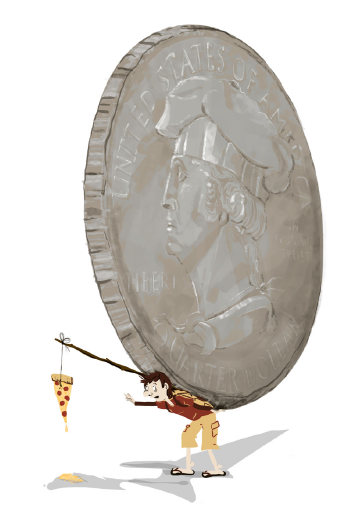Do We Really Have the Best Food?
BY JARED TURKUS
Washington University’s food quality impacts all its students, regardless of their backgrounds, tastes, or majors. In the Daily Meal’s 2013 study, Wash U placed second in university food quality, outranked only by Bowdoin College. Bon Appetit, with exclusive catering rights, staffs all primary on-campus eating locations in the Bears Den, the DUC, Holmes Lounge and the Village. To achieve its stellar reputation, Bon Appetit has consistent kosher, halal, gluten-free and vegetarian offerings and diverse cuisine choices made from top-quality ingredients. It makes an ongoing effort to promote sustainability and healthy eating. While these investments have given Wash U students access to a good selection of food, there are financial downsides to Bon Appetit’s presence at the university.
The current meal point system enables Bon Appetit to hide the true cost of its meal plans. When students register for housing, they select their meal plan for the following year among three options: bronze, silver, and gold. All Bon Appetit food items are priced in meal points, which helps hide the actual cost of Bon Appetit’s monopoly. The cost of the bronze plan is $3802 for 2534 points, representing a 50 percent markup from meal points to dollars. Silver plan membership has a 38.7 percent surcharge, asking $4540 for 3274 points. Finally, the golden ripoff demands $5280 for 4014 points, a modest 31.5 percent premium. Village stir fry, a popular Bon Appetit option, costs 6.05 meal points. $6.05 is not the real price; depending on the plan, students are really paying $9.08, $8.39, or $7.96. The meal point system is Bon Appetit’s clever way to hide costs and collect more profit from gold and silver plan holders. While the markup on these plans is lower, students with the bronze plan will exhaust their higher markups sooner. The bronze plan is the best option for consumers, because once students use their smaller plans, they can start paying with Bear Bucks at any Bon Appetit location. Unlike with meal points, students also have the liberty of using Bear Bucks off-campus at select restaurants and stores. There is no cost shifting with Wash U’s Bear Bucks currency: one dollar equals one Bear Buck. Stir fry no longer costs $9.08 once people run out of bronze meal points, it only costs $6.05. Bon Appetit soon realized that students were favoring the Bear Bucks system over the closed meal point system and barred freshmen from acquiring the bronze plan. The reason is obvious: Bon Appetit does not want to compete with restaurants on the Loop for business; it wants to use the school’s authority to coerce students into buying more expensive food from Bon Appetit.
Bon Appetit is able to maintain such tight control over food because Wash U takes in more revenue by demanding a percentage of the caterer’s higher profits. Apart from Subway and Einstein’s Bagels, Bon Appetit is a monopoly on campus. Meal points are accepted at Subway simply because it was there before Bon Appetit became Wash U’s official caterer. Students cannot use meal points at Einstein’s. Nonetheless, both restaurants are wildly popular with students. They are both also more efficient than BD, DUC, the Village, or Holmes Lounge. Even during peak hours, the staff can generally process more food orders in a shorter amount of time. Lines move very quickly at Subway and Einstein’s because the management understands that it must be competitive to stay in business at Wash U. That same philosophy does not apply to Bon Appetit dining locations at the Village or BD, simply because they do not have to worry about going out of business.
If Wash U truly wants the best experience for its students, it should not renew Bon Appetit’s contract to be the primary food vendor on campus. To lower food prices, the university should allow other caterers to compete on campus. In an effort to attract student business, each company would systematically lower its prices and specialize on a select set of dishes. To avoid a Fast Food Nation style takeover, Wash U could be selective over the brands it allows on campus. Chipotle, St. Louis Bread Co., and Pi Pizzeria are ideal candidates because they promise high quality ingredients and balanced diets. Wash U should endorse these businesses by allowing them to compete on campus. A competing marketplace financed in Bear Bucks empowers students to design their own meal plans by deciding exactly how much they spend on food each semester.
While Bon Appetit does have tasty dishes and useful programs that incentivize healthy and sustainable eating, these commitments do not give the caterer a right to monopolize food control and use its exclusive agreement with Wash U to coerce students into buying more expensive plans. Further, it is unrealistic to expect one caterer to be “the best” for every food dish in every cuisine, as the most successful restaurants and chains focus on a specific food genre. If Wash U wants to maximize its students’ dining opportunities, the administration should embrace competition, drive down prices, and enjoy diverse specializations of
great food.
